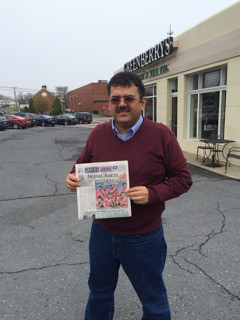
Serving Hispanic readers is a matter of trust

A recent issue of Nuevas Raices, the Harrisonburg, Virginia, weekly newspaper that serves Hispanic readers in the Old Dominion, had just one small coupon ad.
“We don’t trust them,” explains owner Fernando Gamboa, who says his 14,000 readers worry the coupons, standard in U.S. papers, won’t be redeemed. His readers have grown up in countries where rules too often are not followed, says Gamboa.
But trust is a two-way street between him and readers of Nuevas Raices, which means “new roots.” For example, Gamboa rejects submissions to his paper — including paid advertising — that might mislead his readers. “I don’t take ads from Sister Rosa, the palmist,” he says.
Institutional skepticism is one of several differences from mainstream U.S. newspaper audiences Gamboa must consider.
Another is thriftiness. “Remember we make two and three dollars an hour,” he says of his audience. Thus employment ads are prominent in Nuevas Raices.
The newspaper itself functions without a physical office. My meeting with Gamboa at Greenberry’s Coffee Co. in Harrisonburg is apparently a routine meeting place for him and his clients.
Technology helps this cost-cutting approach to putting out a newspaper. The bulk of both news and advertising comes to Gamboa and his wife Maria — who compiles the copy — electronically.
“Everybody has a cell phone,” notes Gamboa. Freelancers use the devices to take photos, then send the pictures and stories by email directly to Nuevas Raices.
“I can’t think of the last time I got a paper submission” of an ad, adds Gamboa, who limits his sales calls to his biggest clients.
Many submissions to Nuevas Raices result from Google searches. Gamboa says he’s received several proposals from consultants promising to help push Nuevas Raices up in the Google results, but his thrifty nature doesn’t see the value. Indeed, a recent search on “Hispanic newspaper in Harrisonburg” found Nuevas Raices was the first Google result.
Gamboa is refining an approach that began with Nuevas Raices’ founding 15 years ago when businessman Geraldo Pandof saw an opportunity to reach Virginia’s expanding Hispanic population. Pandof built the paper by finding significant Spanish-speaking enclaves in small towns and cities across Virginia. He then located grocery stores and convenience stores — even churches — where Hispanics gather and used them as distribution points for his free print product.
The paper is printed by the general circulation Daily News-Record in Harrisonburg and distributed by agents Nuevas Raices hires in 13 localities across central and eastern Virginia.
Hispanics account for 8.9 percent of Virginia’s 8.3 million population as of July 2014, according to the U.S. Census Bureau. Nuevas Raices does not circulate in Northern Virginia — suburban Washington, D.C. — where much of the state’s Hispanic population lives, but rather targets underserved, less urban populations. Harrisonburg, for example, is the county seat for Rockingham, the “Turkey capital of Virginia,” and its poultry plants draw many Hispanic workers. The city’s Hispanic population is 18.6 percent of the 52,000 people in Harrisonburg.
As his general circulation brethren do, Gamboa worries about the future impact of digital competition. But he has an edge: He’s a trained computer science engineer who came to Harrisonburg from Colombia 16 years ago to be a programmer at a local business. In fact, Pandof initially hired Gamboa as a freelancer to create a Web page for Nuevas Raices, which today proudly proclaims it attracts 3,000 visitors weekly.
Nuevas Raices also has a Facebook page, which has 1,146 likes. Gamboa is not a Facebook fan, but recognizes “people like it” and he can post breaking news on its timeline faster than it can appear in the print edition of Nuevas Raices.
However, Gamboa also shares with his community publisher counterparts a belief that his best defense against digital competition is an intense concentration on local news.
Toward that end, he zones his publication. Recently, some copies featured a look at Bell Nursery in Culpeper, Virginia, and other stories of interest to Central Virginia Hispanics. Other copies of that edition focused on stories about Harrisonburg and other Valley of Virginia locations. Gamboa plans to increase the number of zones for his paper.
Nuevas Raices also includes political stories. A recent edition contained a story with a headline that translates to “Donald Trump has been unacceptable from the beginning.”
Gamboa points out that Hispanic economic fortunes can be constrained by lack of documentation. “We can’t get a car loan because we don’t have an ID,” he observes. Once there’s a path to legalization, he feels Hispanic businesses will take off.
And when that day comes, says Gamboa, Nuevas Raices will be ready to serve them.
